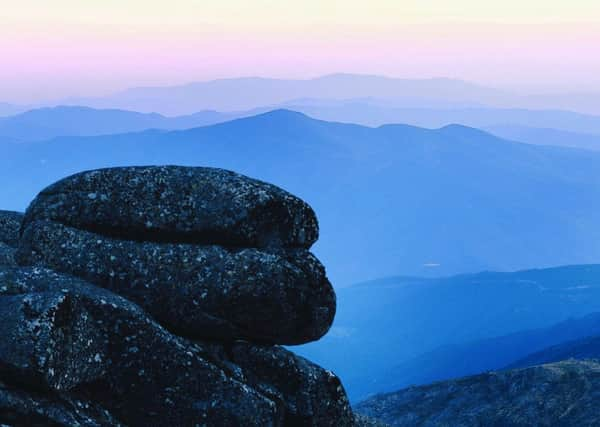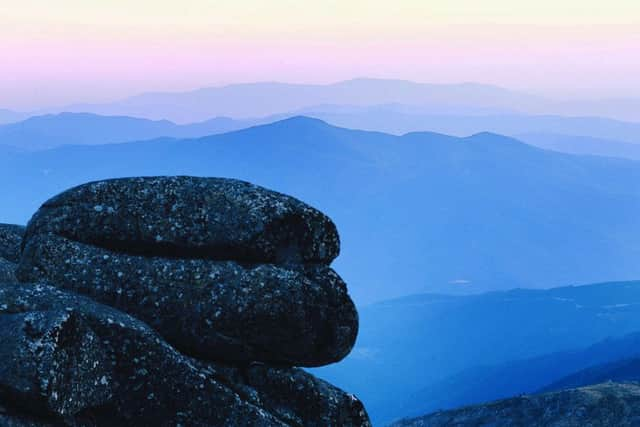More to Portugal than the Algarve


Have you ever been serenaded?” I ask our dainty guide Silvia Aires.
She breaks eye contact and goes bashful. For a moment there is silence as we stand outside the Fado Centre in the Portuguese city of Coimbra.
Advertisement
Hide AdAdvertisement
Hide AdThen a wide smile creeps up her face and the woman who has carried herself with so much decorum over the past couple of days breaks down into a soppy love-struck teen.


“Yes,” she swoons, “once, and he wasn’t very good looking, but it didn’t matter because to be serenaded is beautiful.”
I clocked the same look from every woman inside the Fado Centre - where talented musicians give up their time to perform emotional ballads on the eight-string guitar accompanied by vocals.
I probably donned that same smitten grin as well.
A long time ago it was tradition for men to play a tune outside the home of his desired lady friend. If the serenade worked it would be met by a flicker of the bedroom light.
Advertisement
Hide AdAdvertisement
Hide AdThe pick-up tactic may not be employed here anymore, thanks to the throng of bars nestled in this city dominated by university students and split by the mammoth Mondego River. But Coimbra, and Portugal as a whole, is still a place bound by romance, poetry and passion.
You only have to visit Coimbra’s university for proof.
Once a fortress and then home to a king, today the historic building is internationally renowned for its high class of education.
More than six million books live here. A grand library is its centre piece, where students must book up visits and study time days in advance. At night, a family of bats protect the literature from insects.
Outside, a bustle of tattered black cloaks swamp the university grounds. Tattered, because it’s tradition here to slit the material in celebration of every intimate encounter. And let me tell you, there are some pretty scruffy-but-happy-looking youngsters wandering these halls.
Advertisement
Hide AdAdvertisement
Hide AdOn the day of graduation the cloak is removed and, as the student emerges victorious with diploma in hand, his fellow classmates break into a violent frenzy of snatching and grabbing until they have completely torn off his suit. The only thing to hide his shame is the cloak which by this time is in the hands of a girl he must chase, naked.
“I wish I’d come to university here,” said Silvia.
Serra da Estrela Natural Park
Coimbra is certainly the life of central Portugal, but the soul is only two hours away dispersed amongst isolated communities. This is where we met Joao Tomas, a man who grew tired of life as a corporate lawyer and decided to gamble everything.
He quit his high-flying job in Lisbon and retreated to the rural mountains where single-handedly he is attempting to revive the wool industry.
The eight workers he employees at the previously abandoned factory is a tiny speck on the 800 who once made the historic textile village of Manteigas roar with life. But Joao is confident getting back in touch with his Portuguese routes is the way forward, and believes his boutique range of Burel clothing and furnishings is well placed to spark another industry boom.
Advertisement
Hide AdAdvertisement
Hide AdAbove the village, perched 1500m high in Serra da Estrela Natural Park, sits Joao’s showroom and stunning spa hotel.
Casa das Penhas Douradas is a piece of architectural genius. It’s a quirky ski chalet hiding reams of space carved into the mountain - which is smothered by heaps of snow during the winter. But at this time of year scorching sun gives way to breathtaking views as far as the Spanish border.
In the early 19th century thousands of rich Portuguese fled to these mountains from a deadly outbreak of tuberculous, while the poor were left to perish. Doctors believed the altitude cleansed disease.
“But as years went on we discovered the Algarve and everyone forgot about the mountains,” sighed Silvia.
Advertisement
Hide AdAdvertisement
Hide AdNow the natural park is littered with abandoned homes amongst more than 200km of walking trails on the shelf of central Portugal.
It is unbelievably beautiful and, most importantly, unspoilt by tourists. Up here you won’t be disturbed by the rattle of Callaway golf clubs and the booming laughter of rich Brits on business trips. And it’s because of people like Joao that this vastly undiscovered side of his country can be explored by us in style.
He’s a perfectionist, and his plush hotel pays homage to that. The food is no exception either.
“Food has always been so important to me from the start,” said Joao, whose concept chef Luis Baena is opening up a restaurant in London this summer.
Advertisement
Hide AdAdvertisement
Hide AdComing together to eat is a way of life for the Portuguese. Course after course is thrown in front of you and the carefully chosen wine flows like nobody’s business.
“We don’t tend to binge, but we do drink a lot with our meals,” said our other tour guide Jose Aragao, tucking into some red.
Schist village of slate
It was with foggy heads we met Nuno down and across the mountain in Serra da Lousa the next day.
The 26-year-old is Portugal’s very own Bear Grylls.
He bounds energetically from flower to shrub to tree, pinching herbs for us to smell, stooping over at rivers and quite literally making us drink in the woods.
Advertisement
Hide AdAdvertisement
Hide AdHe shows us the old workers’ homes - now empty - and the forgotten stoves nestled deep in the undergrowth.
We get lost further until we emerge in one of the famous schist villages. We’d been hearing a lot about these since we landed.
The hills glimmer with slate. Almost everything is made with it here, a place completely untouched by modernisation, but yet still humming with locals - even if there are only five of them. I can only describe it as spectacular.
Why schist villages have not been named as one of the wonders of the world is beyond me.
Advertisement
Hide AdAdvertisement
Hide Ad“When visitors come here we say the population grows by ten!” exclaims the one and only shop keeper, Ana Pinto. She moved from Lisbon at 23 to be closer to nature and the roots of Portugal.
We’re funnelled past a waterfall and through another ancient village - of which many inhabitants still largely live off the land - and out into the middle of no where, swallowed up by the wilderness.
A man stands on top of one lone shack in the centre, his hammer breaking the serene tweeting of birds and slapping of water from a nearby stream.
“Hello Steve,” calls Bear Grylls Nuno. “Alright mate, how’s it going?” says Steve who is English. I’ve come to one of the most remote places in the world and I still manage to bump into a Brit.
Advertisement
Hide AdAdvertisement
Hide AdSteve and his wife Julie, who described themselves as being the wrong side of 60, had just left their home in the Yorkshire Dales - which was buried under four feet of snow - for a new life in rural Portugal. And it’s not hard to see why.
“It’s like Portugal’s best kept secret,” Julie tells me, hanging on the door frame of her new home - a shed complete with kettle and bed.
“We thought ‘life’s too short’, looked to move and fell in love with Portugal instantly.”
It’s an ethos that’s echoed around the country.
Dutch-born Jack Brouns, owner of the nearby Quinta da Palmeira in Cerdeira, can you tell you a thing or too about life being too short.
Advertisement
Hide AdAdvertisement
Hide AdIn the early millennium he was diagnosed with a rare muscular disease.
So aggressive was the illness that it made him bed bound in hospital for a number of years and forced him to learn how to walk again.
“So many people say they’re going to make their dreams reality, but hardly anyone ever follows through with them. I decided to,” the hulking dutchman tells me from the comfort of a pool side armchair at his four star hotel.
Jack too uprooted his homeland to the irresistible call of rural Portugal. It took time, but the big friendly giant (we called him BFG Jack) has carved a niche in the market.
Advertisement
Hide AdAdvertisement
Hide AdHis several villas are scattered amongst fruit trees high above an isolated village, and each offers something completely unique - from the traditional Portuguese home to the modern and overwhelmingly spacious apartments.
For the family he even has a stunning two-floor villa, which recently won Jack fame after it featured on the TV show Four in a Bed and stole the show. It boosted custom from Belgium, but Jack is keen to show us Brits there’s more to Portugal than the Algarve.
By Ollie McAteer
Casa das Penhas Douradas offers a double room including breakfast for €120 www.casadaspenhasdouradas.pt
Quinta da Palmeira offers a double room including breakfast for €110 www.qportugal.com
Advertisement
Hide AdAdvertisement
Hide AdQuinta das Lágrimas offers a double room including breakfast for €125 www.quintadaslagrimas.pt/
TAP Portugal (0845 601 0932, www.flytap.com) flies from London Gatwick to Porto twice daily, with return fares starting at £126 including all taxes and surcharges
For more information on Portugal visit www.visitportugal.com